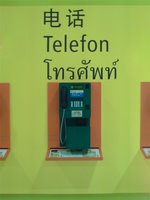I am quite glad that someone took interest in my report on "Dream of the Lotus Pond" by Xiamen Municipality Opera Troupe. I'm not sure if I'd have the chance to watch it, but I believe it would be a very different experience. To be honest, how often can one find a Chinese opera performance being stage outside a conventional proscenium setting (successfully)?
I applaud the troupe for taking this bold step to revolutionalise the opera genre. Come to think of it, in the western world of theatre, there had been so many different theatre movements and theatre genres through the centuries, and each movement or genre is a reaction to an existing movement or social changes. However, this notion of theatrical movements doesn't seem to apply for Chinese opera as yet, although I think the Taiwanese counterpart has been quite active trying to break new grounds. In fact, the fate of Chinese opera is quite bad as people find it harder to connect to this traditional art form as generations pass. I believe it is high time all Chinese practitioners sit up and do something about how to go about making Chinese opera more relevant to the contemporary society (and I don't mean blind substitution of the original language with another). If not, it won't take long before Chinese opera will exist only in history books. Perhaps we can emulate what Xiamen Municipality Opera Troupe had done, but of course we still have to keep some of our existing repertoires, not to say totally stripping it of all its essence.
Anyway, here is a report on the performance in the original Chinese version, and an English translated version done by me for the sake of readers who don't understand Chinese. I apologise in advance if my translation do not quite sound right (give me a break, I'm not a journalist or professional translator!)
《荷塘梦》小剧场里独特上演
观众席与舞台融为一体,可以全方位“看到舞台上发生的生活”
8位演员撑起一台大戏,没有频繁更换的舞台布景和炫目的灯光。舞台和观众席在同一个空间当中,整个舞台就像一个荷塘,绿色的大荷叶,清水浮萍。而观众与舞台的距离近得就像掉进了荷塘里,演员就在面前表演,动作、神态、表情尽收眼底。当苏燕蓉饰演的秦景仙鬼魂戴着面具,挥动长长的衣袖从观众席前走过时,坐在第一排的一位小女孩吓得躲进了父亲的怀里。
昨晚,厦门市歌仔戏剧团排演的大戏《荷塘梦》在厦门文化艺术中心200座实验剧场进行了首次对外彩排。本月19日下午3点,《荷塘梦》将作为“海峡两岸民间艺术节暨歌仔戏展演”的重头戏,在同一地点上演。昨晚现场观众都亲身领略到了实验小剧场的魅力。舞台向前后两侧的观众席延伸,演员下场后就坐在观众席上,他们的一举一动观众看得清清楚楚。乐队也在观众席当中,连演员谢幕都要分别朝着前后两个方向。观众不是正面看到镜框舞台,而是可以感觉到自己正偷偷看到舞台上发生的生活。“很通俗,很接近群众,很亲民”,许多观众这样评价。
导演吴晓江告诉记者,将歌仔戏放在小剧场,是希望歌仔戏除了讲故事之外,还能寻找到更多具有现代意识的呈现方法。一般人认为,人多的或者投资大、场面大的就是大戏,人少的就是小戏,其实不是这样的。这是一个空间的概念,演出环境是假定环境,实际上所有空间都可以充分利用。在西方,小剧场就是实验戏剧的代名词,很多成功的戏都是在小剧场产生的。
Unique Performance of "Dream of the Lotus Pond" in a Black Box
A Performance Where the Audience and the Stage Blends into One
8 actors in a production, without completed scenery or dazzling light. The stage and the audience co-exist in the same space, with the whole stage like a lotus pond with big lotus leaves, clear water and floating plants. The relationship between the stage and the audience has been drawn so close, as if the audience had fell into the lotus pond, and that the actors were just performing in front of them, all actions and gestures vividly executed in full view. When Su Yanrong, acting the role of the spirit of Qin Jingxian, appeared on stage with a mask through the audience, a little girl on the first row actually got a fright and hid into the arms of her father.
Xiamen Municipality Opera Troupe’s “Dream of the Lotus Pond” had it’s first open dress rehearsal in the 200-seater experimental theatre last night. On the 19th of this month at 3pm, this production shall be performed at the same venue, as part of the “Cross Straits Folk Arts Festival cum Gezi Opera Showcase”. Audience who turned up last night experienced for themselves the charm of the experimental black box theatre. The stage extended into the audience from two ends, and actors once offstage will be seated among the audience. Every action carried out by the actors could be seen in full view of the audience. The music ensemble was in the audience as well, and actors had to carry out their curtain call in both directors. The audience were not looking through the regular proscenium opening, but watching as though the drama was unfolding right in front of their eyes. “Very intimate, very direct”; this was what many members of the audience felt.
Director Wu Xiaojiang said that through the process of bringing Gezi opera into a black box, this production aimed to explore more contemporary approach to the staging, apart from mere storytelling. Most people tend to have the assumption that a “daxi” (major opera) meant high production cost or big visual spectacle, whereas “xiaoxi” (minor opera) meant productions with a small cast. This is in fact not true, as the theatre is a spatial concept, and the acting environment is just an illusionary world and in practice, any space can be utilized for performance. In the West, the black box represents experimental theatre and many successful productions were created out of black boxes.







